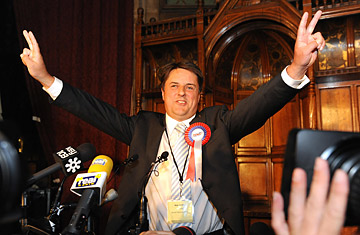
British National Party (BNP) leader Nick Griffin celebrates his election as one of eight MEPs (Members of the European Parliament) for the North West of England
In the midst of a financial downturn, with big government back in fashion and capitalism badly bruised, the left should have swept the European Parliament elections that took place over four days last week. But instead, voters emphatically punished socialist and social-democrat parties — when they could be bothered to show up to the polls.
While there were many messages from the election that took place between June 4 and 7 — including the record low turnout and the rise of the fringe vote — the main one appeared to be a ringing rejection of the centre-left. Across the E.U.'s 27 member states, the story was the same regardless of who the incumbent national government was: voters were shifting rightwards, leaving many social-democrat parties hurting from historic defeats. (Read TIME's roundup on the European election from the U.K., Italy, France and Germany.)
The result is almost perverse. At a time when the left's longstanding complaints about the free market and the lack of workers' protection are being widely acknowledged and agreed with, voters are turning their backs on those parties that now seem to have been so prophetic. "There is an existential crisis for the socialists. Voters do not want socialism, they want a market system that works," says Corien Wortmann-Kool, who was re-elected for the Dutch center-right CDA party. "But the socialists are still rooted in the 20th century. They have not yet broken away from their ideological tradition of opposing capitalism."
The most spectacular result was in the U.K., where beleaguered Prime Minister Gordon Brown's Labour Party scraped a mere 15.7% of the national vote. It limped into third place behind the Conservative Party, with 28.5%, and the U.K. Independence Party (UKIP) — campaigning to pull Britain out of the E.U. — which mustered 17.4% of the vote. (See pictures of Brown.)
And there was little comfort for the left elsewhere in Europe. Although President Nicolas Sarkozy is deeply unpopular in France, his UMP party saw its vote rise to 27.7% from the 16.6% it garnered at the last European elections in 2004, while the Socialist Party slumped from 28.9% in 2004 to 16.5% this time. In Italy, Prime Minister Silvio Berlusconi's center-right coalition surged 6.9% to secure 35% of the vote, ahead of the center-left opposition at 26%. Spain's governing Socialists slipped 4% to 38.5%, behind the opposition Popular Party at 42.2%, while Portugal's ruling Socialists suffered a stunning collapse in support, by 18 points to 26.6%. And it was a similar story in Hungary: the ruling Socialist MSZP lost more than half its vote, tumbling 18% to just 17.4%, opening the way for the conservative Fidesz to romp home with a monstrous 56.4% of the vote. The one major exception to the rightwards shift was in Germany: Chancellor Angela Merkel's governing center-right CDU/CSU saw its vote fall by 7.1% to 37.8%. But it was mainly at the expense of the liberals, greens and former communists — at 20.8%, the Social Democratic Party actually recorded its lowest score since the end of World War II.
But the center left was not the only loser in the elections. The Parliament itself saw its credibility suffer further as voter turnout fell to a record low of 43.1%, compared with 45.5% in 2004. (For the Parliament's first direct elections in 1979, turnout was a remarkable 61.99%). This came despite a gargantuan effort to fight apathy through poster campaigns, television ads and YouTube initiatives.
European Commission Vice President Margot Wallström admits that the turnout reflects badly on the E.U.'s public image. "It doesn't help that European election campaigns are run on national agendas, and national governments use the E.U. as a scapegoat," she says. "If all the failures are the fault of Brussels and all the successes are because of national government, then it becomes very difficult to mobilize voters for these elections." (See pictures of polarizing politicians at LIFE.com.)
The low turnout also helped extremist, single-issue parties and oddball candidates seize seats. In the Netherlands, the Freedom Party, headed by anti-Islam campaigner Geert Wilders, came second to the ruling Christian Democrats with 17%, pushing the Labour Party into third place. Anti-Gypsy extremists in Hungary and Slovakia won seats. In Austria, two far-right parties earned 18%, while Finland's anti-immigrant True Finns won 10% of the vote. And Britain's UKIP, who won 13 of the 72 British seats despite having no members in the 646-member House of Commons, will be joined by two European Parliament newcomers: the far-right British National Party and Welsh nationalist party Plaid Cymru. (Read a TIME piece on the gains made by the BNP.)
But even with the growing support for the fringe, the Parliament has a distinctly conservative hue. With votes in several countries still being counted, the Parliament's loose family of center-right parties, the European People's Party, can provisionally claim 267 MEPs out of the 736-seat assembly. It is followed by the center-left group, the Party of European Socialists with 159 and the centrist Alliance of Liberals and Democrats for Europe with 81.
But will this change anything? Veteran Brussels consultant and lobbyist Paul Adamson says that classic political divisions matter less in the European Parliament. "It is not so much about left or right, but about more or less Europe," he says. "Once the elections are out of the way, the main political groups work out their differences through consensus and compromise. And the three main ones are still all pro-European." With the rightwards lurch and the move to the fringe, it remains to be seen whether being pro-European means the same tomorrow as it did yesterday.
Read TIME's roundup on the European election from the U.K., Italy, France and Germany.
